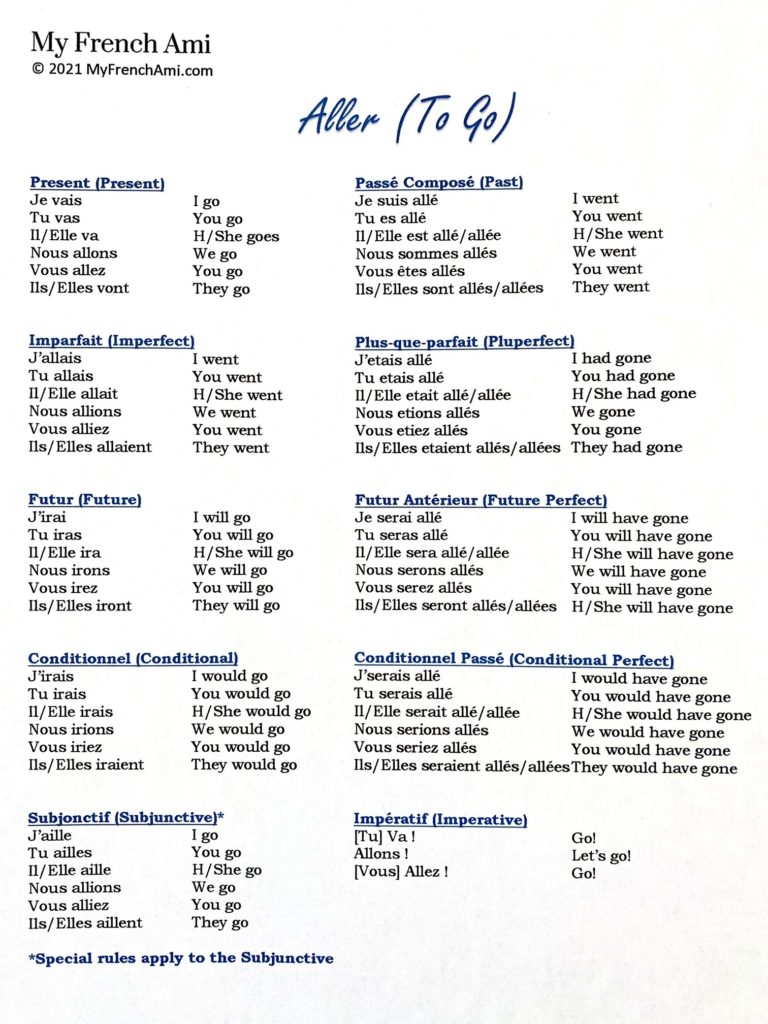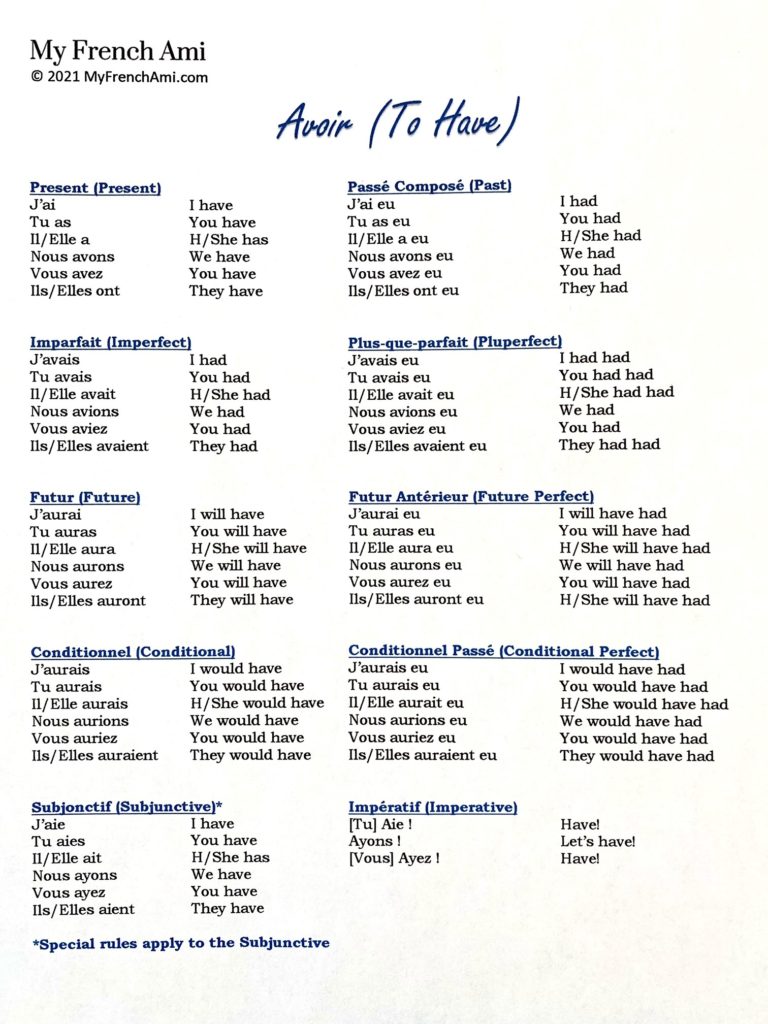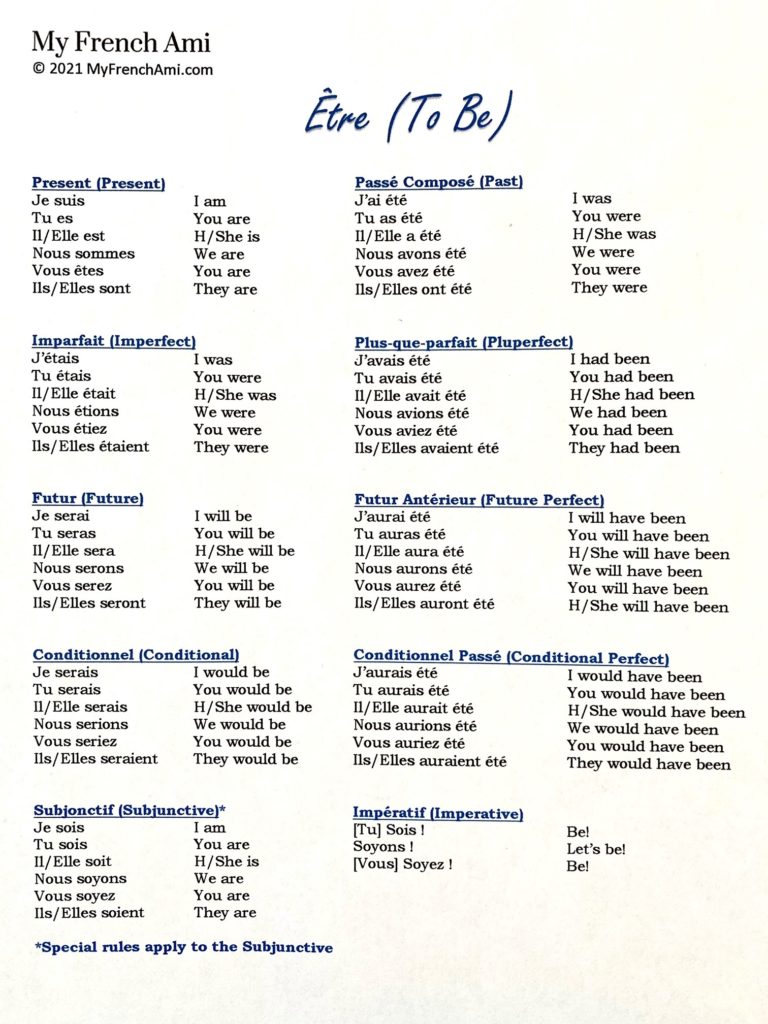Aller, Avoir, and Être – Do you need to know the three most important verbs in the French language? Only if one of your dreams is to confidently order a sinfully delicious meal and yummy drinks while seated at Le Cépage Montmartrois on your next visit to Paris. So, yes, and this is where you should start.
Let me first start by saying that if you memorize aller, avoir, and être, their conjugations, and the most used tenses (about 10 of them), you will learn French much faster and it will no doubt be a more enjoyable experience. Why? Because most languages, French in particular, revolve around actions that are described as “to go”, “to have”, and “to be”. Importantly, avoir and être play outsized roles when conjugating the Passé Composé of all French verbs as well as significant roles in the conjugation of several other tenses. So if you get these three verbs down cold – it won’t take that long – you will doubtlessly be able to comprehend and communicate much more rapidly in French.
Next, to be clear, I am not a French or English teacher and I am not trying to be one. I think that’s evident from my posts but I’d like to get that out in the open before going any farther. That said, if I am making a mistake or not being clear, I’d ask for your gracious understanding and for you to post your thoughts and suggestions as a comment below so that everyone can benefit from your knowledge. We are all students of French and I simply find joy by sharing my views and insights with others on how to learn the language faster and more completely while simultaneously avoiding the mistakes that I made.
Let’s move on to the verbs. Please feel free to download or copy the three pdf’s below, which contain the conjugations of all three verbs in the following tenses: Present, Passé Composé (Past), Imparfait (Imperfect), Plus-que-parfait (Pluperfect), Futur (Future), Futur Antérieur (Future Perfect), Conditionnel (Conditional), Conditionnel Passé (Conditional Perfect), Subjonctif (Subjunctive), and Impératif (Imperative).



I am not going to go into a French grammar lesson here because you can readily find that type of information about Être, Avoir, and Aller elsewhere. What I am going to do is give you my insights on how I learned the verb tenses and what I found to be helpful as I gained a greater awareness of how French verbs are structured:
- First, just memorize these three pages. Please. And take your time, it’s not a race. Focus on accuracy and not speed. If you skimp on this part up front, not only will it slow down your comprehension and progress, but you’ll be back later to . . . you guessed it . . . memorize these three sheets. I couldn’t more strongly recommend this as it will pay off immediately as well as save you an enormous amount of time, pain, and frustration in the very near future.
- If you are still a novice and you haven’t progressed this far (yet) in your French skills, don’t worry about understanding the how and why of the verb conjugations. Those lessons will come later and when you do get there, you will fly through them and totally comprehend what is going on because you’ve committed these sheets to memory.
- If you are at an intermediate or advanced level, I suggest you see if you can recite all of these conjugations from memory without looking at the pages. If you can, bravo! You are probably way more accomplished with the language than you think you are. If you can’t, it’s an excellent way to quickly improve and sand and polish your French verb skills.
- Once you’ve memorized the sheets, look at the structure of how the French verb is conjugated and then compare it to the English conjugation. Can you see the similarities? For instance, for verbs that conjugate with avoir, can you see that you are always using the French word “avais” (or avait, avions, aviez, or avaient) to say “had” in English? And all you have to do is swap the past participle (participe passé) to change the what you want to say – that is, from J’avais été (I had been) to J’avais couru (I had run), J’avais donné (I had given), J’avais marché (I had walked), etc. Do you see how similar the structure in French is to the structure in English? This was eye-opening for me.
- Understand the difference between the Passé Composé and the Imparfait.
- Passé Composé: Je suis allé au supermarché (I went to the supermarket).
- Imparfait: J’allais au supermarche. (I went [used to go or would go] to the supermarket.)
- They seem to be the same, right? Nope. In the Passé Composé, the action is over, completed, finished. The easy to way to remember this is that if the action is in the past and 100% done, you use the Passé Composé. If the action is in the past but not done (or ongoing or unclear if it is done), then it is the Imparfait.
- Notice that the Imparfait and the Conditionnel:
- Have the SAME endings: -ais, -ais, -ait, -aions, -aiez, -aient
- BUT the Imparfait uses the STEM (chop off the -er, -ir, or -re from the verb)
- Ex. J’invitais, tu invitais, il/elle invitait, etc.
- AND the Conditionnel uses the INFINITIVE (the verb in it’s original form)
- Ex. J’inviterais, tu inviterais, il/elle inviterait, etc.
- Essentially, the Imparfait is “would” in the past and the Conditionnel is “would” in the future. This is strange to Americans because in English we use “would” for both the past and the future. As an example:
- (Ex. of “would” in the past) When I was young, I would invite children to my party.
- Quand j’etais jeune, j’invitais les enfants à ma fête.
- (Ex. of “would” in the future) If I were you, I would invite Jean to the party next week.
- Si j’etais toi, j’inviterais Jean à la fête la semaine prochaine.
- (Ex. of “would” in the past) When I was young, I would invite children to my party.
Ok, so I know I’m getting wonky with the details here so I’ll bring this to a close but with a bit of luck I’ve been able to open your eyes to how verb structure and conjugation is logical in French. Once you know the rules and can spot the patterns, you can pretty quickly and accurately surmise what the right verb tense is and correctly conjugate the vast majority of the time.
I sincerely hoped this helped with your understanding of French verbs. Again, I didn’t want this to be a grammar lesson but more a sharing my insights. Once I realized myself how verbs were conjugated in French, my comprehension (did he say we would be going to the zoo or we will be coming back from the zoo?), understanding, and enjoyment of the language really improved significantly.
Bonne chance ! And please leave a comment if you have suggestions of how to help others better understand and conjugate French verbs.

